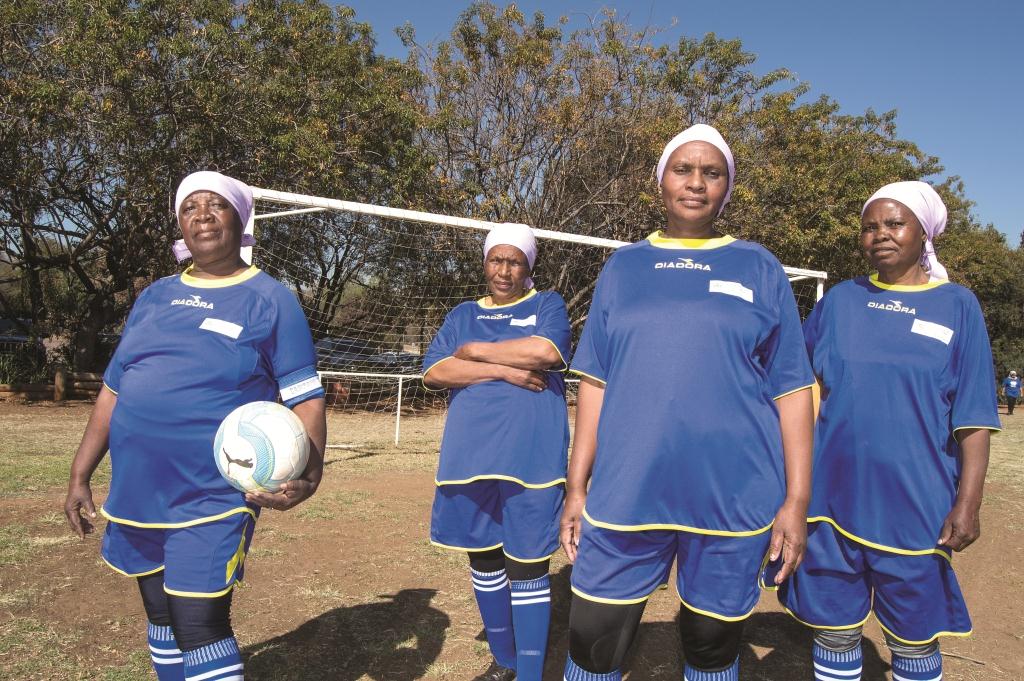One of the oldest members of Vakhegula-Vakhegula, a soccer club in South Africa’s Limpopo province, is 85-year-old Gavaza Mathebula. This football club is like no other. Also known as ‘soccer grannies’, the club consists of 13 teams, all of whose players are elderly women.
To celebrate women’s month in South Africa, the United Nations (UN) even organized a friendly soccer match between themselves – an all-female soccer team – and Vakhegula-Vakhegula (meaning ‘grannies’ in Tsonga) on August 12. The grannies lost, but overall, they had won hearts even before they started.
Speaking before the kick-off, Phumzile Mlambo-Ngcuka, Executive Director of UN Women, said sport is usually associated with younger people but projects like Vakhegula-Vakhegula ensure everyone is involved, no matter their age.
On the pitch was 68-year-old Annah Kgofolo, a grandmother of nine, who has been leading one of the club’s 13 teams since its inception in September 2012. She says playing soccer has immensely helped her and her teammates.
“When we go to the clinic for check-ups now, we find that we are fine, and able to live healthy and do household chores,” she says. They sometimes even play against opponents as young as their grandchildren but are often undermined.
“We have won about three matches so far,” says Kgofolo.
At the end of the match with the UN, the grannies lost 1-0, but the UN signed off with high praise for them, saying they see the ageing population as contributors to the development, and whose capabilities can add value to the society and the country’s policies and programs.
Vakhegula-Vakhegula was started in Limpopo by social worker Rebecca ‘Beka’ Ntsanwisi in 2003, and since then, other villages around the country have encouraged their senior citizens to take up soccer to stay fit.
“Our hope is to play against African countries and to at least be ranked in the top numbers. So far we have played with Zimbabwe,” says Ntsanwisi.
Even a documentary, Alive and Kicking: Soccer Grannies of South Africa, has been made on the soccer grannies, and it has received international attention, scooping several awards. According to the film’s makers, over 40 informal teams have been created across the country.
Representatives from the UN say the growing number of women and grannies playing soccer in various communities testifies the advancement of gender equality in the country as part of the Sustainable Development Goals.
This is especially pertinent as women often stop playing sports to conform to tradition and stereotypes.
Before launching Vakhegula-Vakhegula, Ntsanwisi, a 48-year-old mother of two, had been diagnosed with colon cancer. Her community work and frequent trips to the hospitals made her realize there were “a lot of sick elderly women” who needed help.
She would ask them where they experienced pain. The grannies would point to sore areas on their bodies and that made her realize they needed exercise to combat chronic illness.
Ntsanwisi’s doctors would also goad her to exercise to keep fit and not just depend on pills. This led to her inviting the older women in her community to be part of a soccer club so they could exercise together.
Soccer was the perfect choice for Ntsanwisi because in other sports like netball, players are required to jump.
“Jumping wouldn’t really help them, but soccer is a kicking and running sport. They run which helps the whole body,” she says.
When they are not dribbling or shooting goals, the grannies are making a living selling fruit and vegetables on the streets, or are domestic workers and pensioners.
Their soccer routine involves training twice a week, from 4.30AM until 6AM, after which they head home to commence their chores or get ready for work.
In an area where teenage pregnancy, poverty and unemployment is rife, Ntsanwisi says it is the norm for grannies to look after their grandchildren, but the soccer grannies simply “refuse to babysit”, which then discourages teenage pregnancy.
Vakhegula-Vakhegula is a great example of promoting healthy living among elderly women but it goes beyond the soccer field.
The club is also involved in charity work in their communities aiding poverty-stricken families and granting bursaries to disadvantaged students.
Twice a year, several teams in the club compete in the Top Eight league, also formed by Ntsanwisi in the hope of upholding club morale. In 2014, five grannies from the club joined the festivities of the Soccer World Cup in Brazil.
“The soccer-playing grannies are professional and very busy. We are like Banyana Banyana,” says Ntsanwisi, who is also a radio presenter on a local radio station, Munghana Lonene FM.
Just before entering the pitch, the grannies encourage each other with their vibrant singing. In their native Tsonga, they chant ‘when we get along, we make miracles’. Grandmothers kicking around on a football pitch. To the onlookers, that’s miracle enough.
